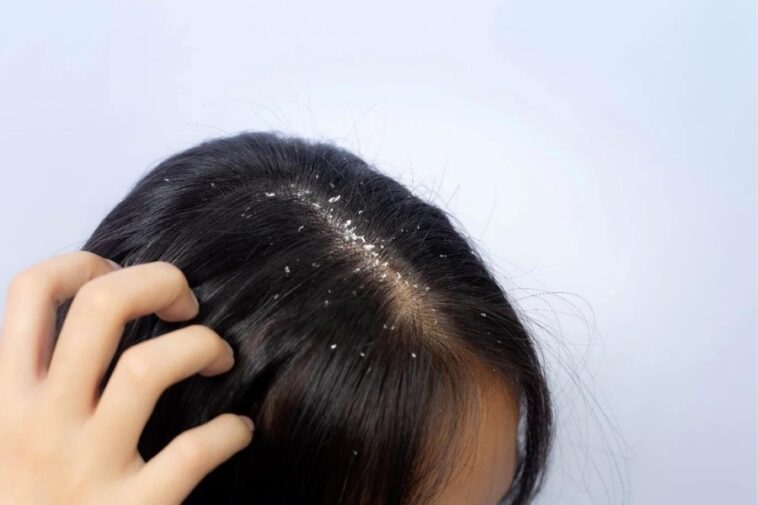Dandruff, which is a prevalent scalp issue identified by the presence of flaky skin, persistent itching, and discomfort, can affect individuals across all age groups, leading to not only physical irritation but also potential social embarrassment.
Fortunately, there exist numerous effective methods to address and combat dandruff.
This blog delves into the various factors contributing to dandruff’s development and provides a plethora of practical tips, remedies, and strategies aimed at helping individuals effectively eliminate this bothersome scalp condition for enhanced comfort and confidence.
Causes of Dandruff
Dandruff can occur for various reasons, and understanding the root cause is essential for effective treatment. Common causes include:
- Dry Skin: People with dry skin are more prone to dandruff. When the scalp lacks moisture, it becomes flaky and itchy.
- Seborrheic Dermatitis: This is a common condition that causes irritated and oily skin. It often affects areas rich in oil glands, including the scalp, and results in yellowish flakes.
- Malassezia: A type of yeast-like fungus that naturally exists on the scalp. When it grows uncontrollably, it can irritate the skin, leading to dandruff.
- Hair Care Products: Some shampoos, conditioners, or hair styling products contain harsh chemicals that can irritate the scalp and cause flaking.
- Poor Hygiene: Infrequent washing of hair can cause oil and dead skin cells to accumulate on the scalp, leading to dandruff.
- Dietary Deficiencies: A lack of essential nutrients, such as B vitamins and zinc, can contribute to dandruff.
Effective Ways to Get Rid of Dandruff
1. Use Anti-Dandruff Shampoo
Anti-dandruff shampoos are formulated to target the root causes of dandruff. They contain ingredients like zinc pyrithione, ketoconazole, selenium sulfide, and salicylic acid, which help to control fungal growth, reduce inflammation, and eliminate flakes. It’s important to use the shampoo regularly and leave it on for a few minutes before rinsing to allow the active ingredients to work.
2. Keep Your Scalp Clean
Maintaining scalp hygiene is crucial in the fight against dandruff. Wash your hair regularly to remove excess oil and dead skin cells.
However, avoid over-washing, as it can strip your scalp of natural oils, potentially worsening the condition. Aim to find a balance that suits your hair type.
3. Moisturize Your Scalp
Dry skin is a common cause of dandruff, so it’s important to keep your scalp moisturized. Opt for natural oils like coconut oil, olive oil, or argan oil, which are known for their hydrating properties.
Massage a small amount of oil into your scalp, leave it on for at least 30 minutes (or overnight), and then wash it out with a mild shampoo.
4. Try Home Remedies
Several natural remedies have been proven effective in reducing dandruff. Some of these include:
- Tea Tree Oil: Tea tree oil has anti-fungal and anti-inflammatory properties. Adding a few drops to your shampoo or massaging diluted tea tree oil directly onto your scalp can help control dandruff.
- Apple Cider Vinegar: Apple cider vinegar can help restore the pH balance of the scalp and reduce fungal growth. Mix equal parts of apple cider vinegar and water, apply it to your scalp, and leave it on for 15-20 minutes before rinsing.
- Aloe Vera: Aloe vera soothes irritation and has anti-fungal properties that can help reduce dandruff. Apply fresh aloe vera gel to your scalp, leave it on for 30 minutes, and then rinse with a mild shampoo.
5. Maintain a Balanced Diet
Your diet plays a significant role in the health of your skin and scalp. Eating foods rich in vitamins and minerals can help reduce dandruff. Specifically, ensure that your diet includes:
- Zinc: Found in foods like oysters, pumpkin seeds, and nuts.
- B Vitamins: Present in eggs, meat, whole grains, and leafy greens.
- Omega-3 Fatty Acids: Found in fish, flaxseeds, and walnuts, omega-3 fatty acids promote healthy skin and can help reduce dryness.
6. Manage Stress
Stress is known to exacerbate dandruff. When you’re stressed, it can weaken your immune system, making your scalp more susceptible to irritation and fungal growth.
Incorporating stress-reducing practices like meditation, yoga, or regular exercise can help keep dandruff at bay.
When to See a Doctor
If dandruff persists despite trying home remedies and over-the-counter treatments, or if the scalp becomes red, swollen, or painful, it’s best to consult a dermatologist.
You may be dealing with a more serious condition like psoriasis or eczema, which requires professional treatment.
Dandruff can be bothersome, but with the appropriate treatment, it is completely treatable.
Maintaining proper scalp cleanliness, using anti-dandruff shampoos, experimenting with home cures, and eating a well-balanced diet will help you reduce dandruff and have a healthy scalp.
If symptoms persist, consult a healthcare expert for personalized remedies.





GIPHY App Key not set. Please check settings